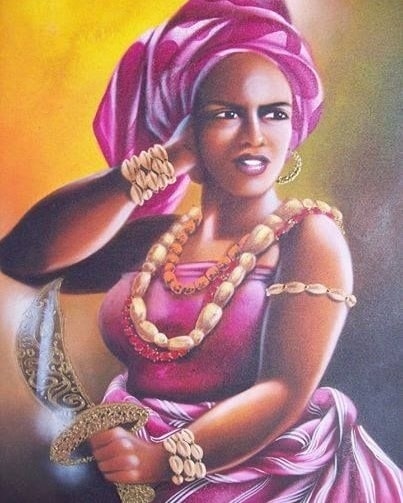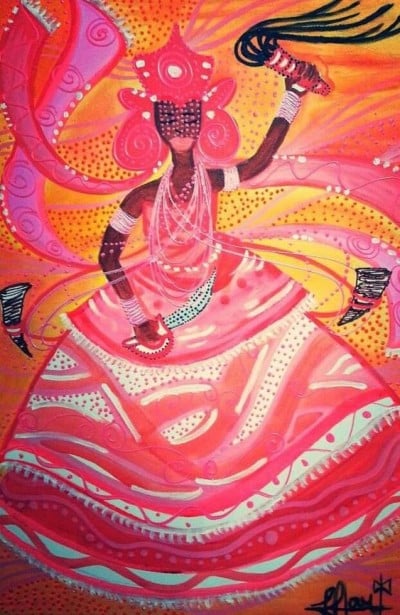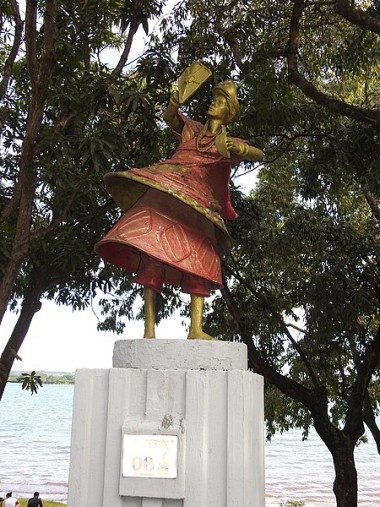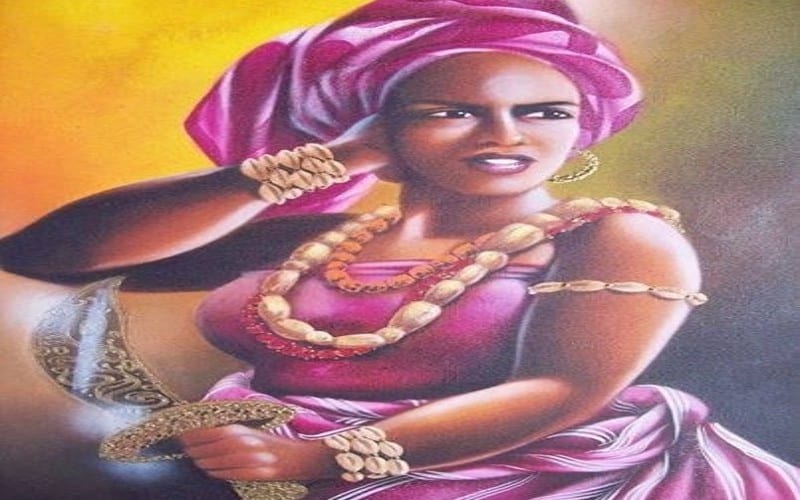Orisha Oba is a goddess in Yoruba mythology, distinguished for her association with wealth, comfort, and generosity. She is believed to be the goddess of prosperity, abundance, and material well-being, and is often invoked by those seeking financial stability and security.
In Yoruba culture, Oba holds a significant place in the lives of her devotees. She is considered a patron of the home and family, and is often sought out for protection and guidance in times of need. Her devotees believe that she watches over them and provides comfort and support in times of hardship.
Mythology of orisha Obà
Obà and Sango
In Yoruba mythology, Obà is the daughter of Obatala and Shango’s first wife. She represents a loving wife who is willing to sacrifice everything to gain the love of her husband. When her husband got Osun and Oya as concubines she wasn’t bothered much.

Her worries started when Shango’s concubines became his favorites and she felt rejected and lonely. She wanted to get her husband’s attention and love so she heeded osun’s advice. She had told her to cut off her ear and prepare a soup for Shango.
On the day she was to cook for her husband, she made the soup with her ears and served the meal but unfortunately, her husband found out and was disgusted and very furious. He couldn’t forgive her, so he banished her from his house. When Obà returned to her father’s house and narrated her story, her father understood her pains. For this reason, he granted her request:
“I want to go where no one can see me, I want to live with the dead, with the spirits, with whom I cannot be harmed”.
Obatala gave Obà charge over the cemeteries and together with Yewá she lives in the cemeteries and represents the reckless warrior. She guards the tomb unlike Yewá who lives inside the coffin.
Characteristics of Obà
Here are some characteristics of Orisha Obà
1. Strength: Orisha Oba is a symbol of strength and resilience. She is someone who has overcome challenges and obstacles, and has emerged stronger and more determined.
2. Loyalty: Orisha Obà is a loyal and faithful wife. She was loyal to her husband and was willing to get his love back even when he was infidel.
3. Self-reliance: Orisha Oba is a self-sufficient and independent individual. She is someone who relies on herself and her own abilities to get things done.
4. Confidence: Orisha Oba exudes confidence and self-assurance.
5. Intelligence: Orisha Oba is intelligent and wise. She is someone who thinks critically and makes informed decisions.
6. Her favorite people include faithful wives, prostitutes( for some weird reason), people with cheating spouses e.t.c.
Significance of Orisa Obà in Yoruba religion

Although Orisa Obà is not as celebrated as other river orishas in Yoruba religion, she holds a significance place in Yoruba mythology. She is the orisha of wealth, comfort, and generosity, and is often invoked for these purposes. Here are some of the significance of Orisha Oba:
1. Wealth: Orisha Oba is associated with wealth and prosperity. She is often invoked by those who desire financial success and stability. Her influence can bring about abundance, prosperity, and financial security.
2. Comfort: Orisha Oba is also associated with comfort and ease. She is often invoked by those who seek peace and tranquility in their lives. Her influence can bring about a sense of calm and relaxation, helping to soothe the mind and body.
3. Fighting enemies: Orisha Oba is also associated with fighting enemies and overcoming adversity. She is often invoked by those who seek strength and courage in the face of challenges. Her influence can give people the strength and determination they need to overcome their enemies and achieve their goals.
4. Generosity: Orishas related to water are known for their generosity. Orisha Oba is known for her generosity and kindness. She is often invoked by those who seek to be more giving and charitable. Her influence can inspire people to be more generous and to give back to their communities.
Powers of oba
Obà is a distinguished Orisha in the Yoruba religion and is associated with various powers and qualities. Here are some of the attributed powers of Orisha Oba:
1. Goddess of Marriage: Obà is known as the Goddess of Marriage in Yoruba mythology. She is believed to possess the power to bless and protect marriages. Devotees seek her guidance and blessings for harmonious relationships, marital bliss, and fertility.
2. Home Management: Obà is associated with domestic skills and the management of the household. She is believed to possess the power to bring order, harmony, and prosperity to the home. Devotees may seek her guidance for matters related to homemaking, organization, and family well-being.
3. Healing and Restoration: Obà is also associated with healing and restoration. Her energy is believed to have the power to heal emotional wounds, mend broken relationships, and bring about reconciliation. Devotees may call upon her for support during times of emotional distress or when seeking resolution.
4. Beauty and Grace: Obà is often depicted as a beautiful and graceful Orisha. Her energy embodies elegance, charm, and femininity. Devotees may seek her assistance in matters related to personal beauty, confidence, and self-expression.
5. Justice and Fairness: Obà is associated with justice and fairness. She is believed to be a protector of the oppressed and a champion of righteousness. Devotees may call upon her for guidance in matters of justice, fairness, and standing up against injustice
Symbols of Orisha Obà
Colors
- Pink.
- Red.
- White.
- Burgundy.
Animals
- Female local hen.
- Older female goat.
- Pigeons.
Objects
- Bandage (around her head).
- Flowers.
- Candles.
Food
- Corn meal.
- Ekuru (Bean pudding).
Worship and offerings of orisha Obà
Worship

Oba worship ceremonies are held on November 25th and are usually at rivers and fountains. Her devotees decorate her altar with pink colors and offerings. Her devotees place a picture or statue of her on the altar. It is said that Obà can’t dance but different dances can be performed in her honor.
Offerings
Below are some common offerings associated with Orisha Oba:
1. Flowers: Fresh flowers, particularly those with vibrant colors, are commonly offered to Orisha Oba. Roses, lilies, and other blossoms are chosen as symbols of beauty, femininity, and grace.
2. Beans with onions: Cooked beans with onions is a traditional offering to Orisha Oba. It represents sustenance and nourishment, and it is believed to please the Orisha.
3. Shrimp: Shrimp is considered a delicacy and is often offered to Orisha Oba as a symbol of abundance and prosperity.
4. Female goats: In some traditions, female goats may be offered as a sacrificial animal to Orisha Oba. This offering represents devotion and faithfulness.
5. Pigeons: Pigeons are sometimes offered to Orisha Oba as a symbol of peace, purity, and divine connection.
6. Plums: Plums are considered a favored fruit of Orisha Oba, and they are often presented as an offering during rituals or placed on altars.
7. Water from a lake or pond: Water from lake or pond should be given.
Oriki (praise poetry) of orisha Obà
Oríkì is the oral praise poetry of the indigenous Yórùbá communities of Western Africa.
Orí” means head
“Kì” means to praise, or greet, and offer accolades by way of a song or a chant.
Eleko ajigboja
Yagba yagba fuule
Asin Omo de ibi eru Igbo ba
Ina onpapa to le
Bi eni ti Jo mo
Obinrin lose logbe tin gbe ni Ile ayawa
Omo mi ye eya kere o.
Orin(song) of orisha Obà
Eleko yereyere
Asaabo yereyere
Eleko Omo lewa
Asaabo Omo lewa eni.
Ilè Obà (land of Obà)
Ilè oba is situated in Oyo east local government, Nigeria. It is dominated with people whose main occupations are farming, palm oil processing and fishing. It is surrounded by the Obà river called Odo Obà. Ilè Obà is affiliated to Orisa Obà.
Odo Obà (Obà river)
The Oba River (Yoruba: Odo Ọba) is a river in Oyo and Osun States in Nigeria. It is the main tributary of the Osun River. The landscape varies from wooded savanna in the north to rain forest in the south. Most of the people who live along its length practice farming and fishing.
Enduring Legacies of Orisa Obà across borders
The recognition and worship of Orisha Obà beyond Nigeria’s borders can be attributed to the African diaspora and the transatlantic slave trade. When enslaved Africans were forcibly brought to the Americas, their religious and cultural practices traveled with them. Despite the oppressive conditions they faced, they managed to preserve their spiritual traditions by blending them with elements of Catholicism and indigenous beliefs in the new lands.
Santería (Cuba)
In Cuba, the Yoruba religious practices merged with Catholicism to form Santería. Obà, known as Oba, is one of the Orishas highly sacred in this syncretic religion. In Santería, she is associated with Saint Catherine of Alexandria. Her attributes and characteristics moreover are closely intertwined with those of the Catholic saint.
Candomble (Brazil)
In Brazil, the Yoruba religious practices evolved into Candomblé. In this Afro-Brazilian religion Obà is known as Oxum Obà. Oxum Obà is considered one of the female Orishas associated with femininity and marriage as well as domesticity. The worship of Oxum Obà involves rituals, drumming, dances, and offerings to honor her presence and seek her blessings.
In these diasporic traditions, the worship of Obà has adapted and transformed to suit the cultural and social contexts of the respective regions. The specific rituals, songs, and practices associated with Obà may vary, but the core essence of venerating Obà as a powerful and revered Orisha remains intact.
The recognition and spread of Orisha Obà across borders highlight the resilience and adaptability of Yoruba religious practices in the face of historical challenges. It also showcases the enduring connection between African diasporic communities and their ancestral heritage, allowing them to maintain a sense of cultural identity and spirituality in their new environments.
Final Thoughts
In Yoruba mythology, Orisha Oba is associated with wealth, comfort, and generosity. She holds significance in Yoruba culture as a patron of the home and family, and is often invoked for protection and guidance. Her worship has spread beyond Nigeria’s borders, adapting to different cultural contexts in Cuba and Brazil.
Featured Image Credit: atcwicca on Instagram

